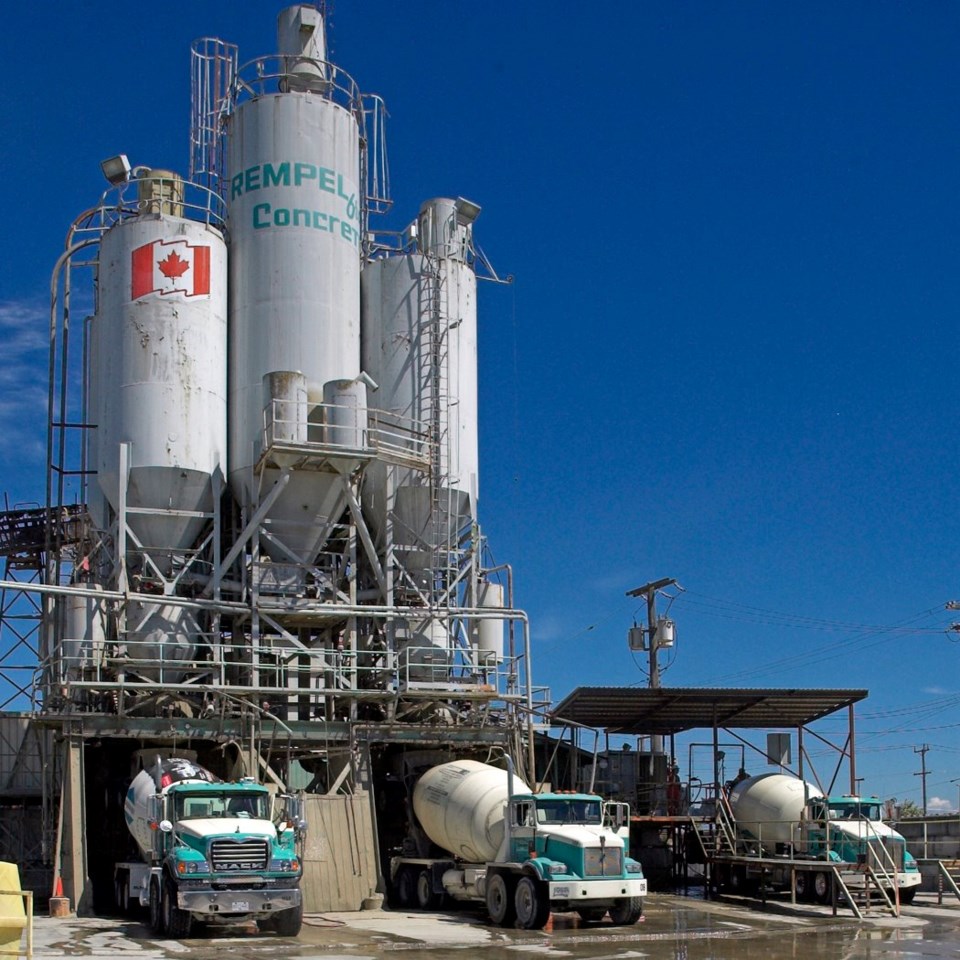Thousands of housing units as well as hundreds of jobs are at stake as a strike by members of Teamsters Union Local 213 and the International Union of Operating Engineers Local 115 choke the supply of cement to construction sites across the Lower Mainland.
“We’re starting to hear about it from vendors, contractors, and if it becomes a protracted dispute, the consequences will be serious and very significant,” said Chris Gardner, president of the Independent Contractors and Businesses Association. “Those consequences will range from project delays, project cost increases, workers being laid off, and that will affect all kinds of projects.”
Approximately 134 workers at six Rempel Bros. Concrete facilities have been on strike since May 21. An additional 166 workers at six other facilities operating under the Ocean Concrete and Allied Ready Mix banners have stopped work in solidarity. All three companies are owned by Lehigh Hanson, part of the Heidelberg Cement Group.
Together, the 12 facilities affected produce approximately 40 per cent of the concrete for construction sites around the Lower Mainland. These include both public and private projects ranging from housing to infrastructure.
“There is no way to replace that amount of concrete,” Gardner said. “If [the strike] goes on, you will have layoffs, and the costs of all of that will be borne by contractors, taxpayers and the first-time homebuyer.”
Many builders, who have seen developers press pause on projects as a result of construction cost increases, now face the prospect of further delays as a result of the concrete strike.
Homebuilders Association Vancouver (HAVAN) members are being told to prepare for a lengthy strike, with constraints on the concrete supply expected to last into October. They’ve been told not to start projects that require concrete because of the potential for delays.
Builders have already been facing significant delays from supply chain disruptions, requiring them to build additional time into their construction schedules. The concrete strike is compounding the delays.
“If you’ve got a concrete delay and your site’s shuttered for two months, you can’t recapture that,” Bryan Reid, president of Kindred Construction Ltd. in Vancouver told commercial real estate association NAIOP last week.
The labour dispute is also compounding a reduced supply of concrete following a fire at the Lafarge plant in Richmond on May 31 and a maintenance shutdown at the Ash Grove Cement plant in Seattle. While these issues may pass in a couple of weeks, the net result is a 75 per cent reduction in the Lower Mainland’s concrete supply.
Gardner says several contractors are considering laying off workers. One builder he spoke with has 10 projects that were set to receive concrete from Rempel. It’s now considering laying off workers.
“Those formworkers aren’t going to be able to do much work, and the rebar guys are going to be out,”
he said. “It’s all over.”
Any workers laid off will be difficult to rehire, because workers not needed at one site will be snapped up by others given the tight labour market.
HAVAN notes that this was the case during a similar strike in Ontario this spring, which lasted about a month. With the strike now at the same point, the risks are clear.
“We are seeing an erosion of labour resources on a daily basis,” said Ron Rapp, CEO of HAVAN.
Should the strike last the rest of the summer, Rapp said the impact would be “catastrophic.”
“You’ve got some major projects that are stalling,” he said. “It’s rapidly descending into chaos.”
ICBA has asked Victoria to appoint a mediator to work with the two sides in the BC dispute to facilitate a settlement and prevent a prolonged strike.
“The union’s gone on record to say we’re at an impasse, and we can’t afford an impasse,” Gardner said.
“Given that so much of the market is taken out of production, doing that now, sooner rather than later, makes sense.”
Rapp agrees that intervention may eventually be in order.
“HAVAN’s position is, let’s get back to work, because if this carries on the damage is going to be substantial,” he said.
The B.C. Ministry of Labour said mediation services are available to both sides through the province's Labour Relations Board, but it has declined to intervene in the dispute.
"The Ministry of Labour respects the integrity of the collective bargaining process, which means allowing the two sides to negotiate freely on their own," the ministry said in a statement.
Working conditions are a primary issue in the dispute. The two sides began bargaining in January, but Lehigh says its offers to date have been rejected, meaning the strike could drag on through the prime summer construction months.
Barry Capozzi, business agent for Teamsters Local 213, did not respond to a request for comment.
Lehigh and the union representatives were scheduled to resume discussions this week.



